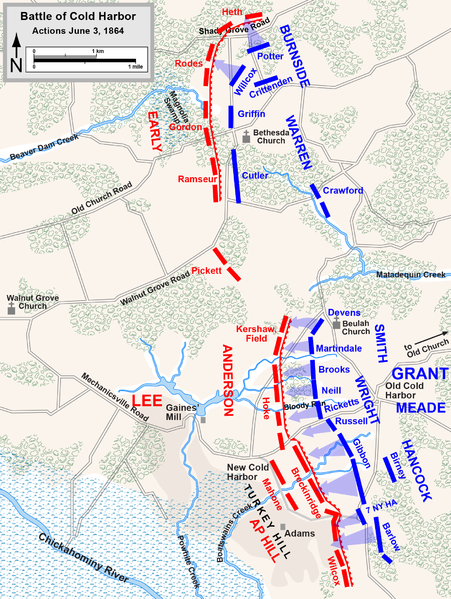And, after that, the chunky man from the West,
Stranger to you, not one of the men you loved
As you loved McClellan, a rider with a hard bit,
Takes you and uses you as you could be used,
Wasting you grimly but breaking the hurdle down.
You are never to worship him as you did McClellan,
But at the last you can trust him. He slaughters you
But he sees that you are fed. After sullen Cold Harbor
They call him a butcher and want him out of the saddle,
But you have had other butchers who did not win
And this man wins in the end.
Stephen Vincent Benet, John Brown’s Body
The main Union assault at Cold Harbor went in on the foggy morning of June 3 at 4:30 AM, the three corps of Smith, Wright and Hancock hitting the Confederate left. Some of the Union veteran troops, in those pre-dog tag days, pinned white notes with their names and addresses on the backs of their uniforms so their bodies could be identified, they having learned the hard lesson that assaulting fortified lines held by Confederate infantry was bound to cause huge casualties among the attacking force. The attack went in blind, as, stunningly, no had bothered to reconnoiter the Confederate lines and draw up maps. One Union soldier in Gibbon’s division had an apt comment on this military malpractice: “We felt it was murder, not war, or at best a very serious mistake had been made.”
Smith’s attack on the right quickly bogged down, his men being funneled through two ravines where they were cut down in large numbers. Wright’s men in the middle, still weary from their attacks on June 1, made little effort, and their attack was pinned down almost as soon as it started. Hancock’s attack on the Union far left pierced the Confederate lines, but the breach was sealed and the Confederates repulsed Hancock with heavy loss. The attacks were all over by 7:30 AM. Grant wanted attacks to resume, but by 12:30 PM he had become convinced that further attacks were simply impossible.
The Union casualties from the assault have been estimated from 3,000-7,000. I believe the upper estimate is more likely correct. The Confederates incurred about 1500 casualties. The armies would remain confronting each other at Cold Harbor until June 12, but there would be no further attacks. Total Union casualties from all the fighting at Cold Harbor were around 12,000 to 5,000 Confederate, the same disparity as at Fredericksburg, the Cold Harbor assault of June 3, resembling the futile Union assaults of that battle.
Cold Harbor represented the nadir of Union fortunes during the Overland Campaign. After huge casualties, 55,000, the Army of the Potomac still confronted an Army of Northern Virginia that could hold any position it chose to defend. Grant seemed at loose ends for a while after the defeat of June 3, uncertain what to do next. However, during the Civil War Grant never allowed any setback he suffered to remain final. A failure all of his life except for war, matrimony and his last gallant race with the Grim Reaper at the very end to complete his Personal Memoirs to restore the family fortunes, he was determined that neither the Union nor he was going to lose this War. Here are his comments in his Memoirs about the assault at Cold Harbor of June 3:
I have always regretted that the last assault at Cold Harbor was ever made. I might say the same thing of the assault of the 22d of May, 1863, at Vicksburg. At Cold Harbor no advantage whatever was gained to compensate for the heavy loss we sustained. Indeed, the advantages other than those of relative losses, were on the Confederate side. Before that, the Army of Northern Virginia seemed to have acquired a wholesome regard for the courage, endurance, and soldierly qualities generally of the Army of the Potomac. They no longer wanted to fight them “one Confederate to five Yanks.” Indeed, they seemed to have given up any idea of gaining any advantage of their antagonist in the open field. They had come to much prefer breastworks in their front to the Army of the Potomac. This charge seemed to revive their hopes temporarily; but it was of short duration. The effect upon the Army of the Potomac was the reverse. When we reached the James River, however, all effects of the battle of Cold Harbor seemed to have disappeared.


Cold Harbor is the only Civil War battlefield I have had the chance to visit; my husband and I stopped here on our way back from Virginia Beach in 1994. As nondescript as it appears today — just a few small rises in the ground beneath some trees — I remember to this day the eerie feeling I got standing there, knowing that so many men had died on that ground. I’ve never experienced anything like it before or since.
You are not alone in feeling that Elaine:
http://john-banks.blogspot.com/2011/07/chasing-ghosts-at-cold-harbor.html